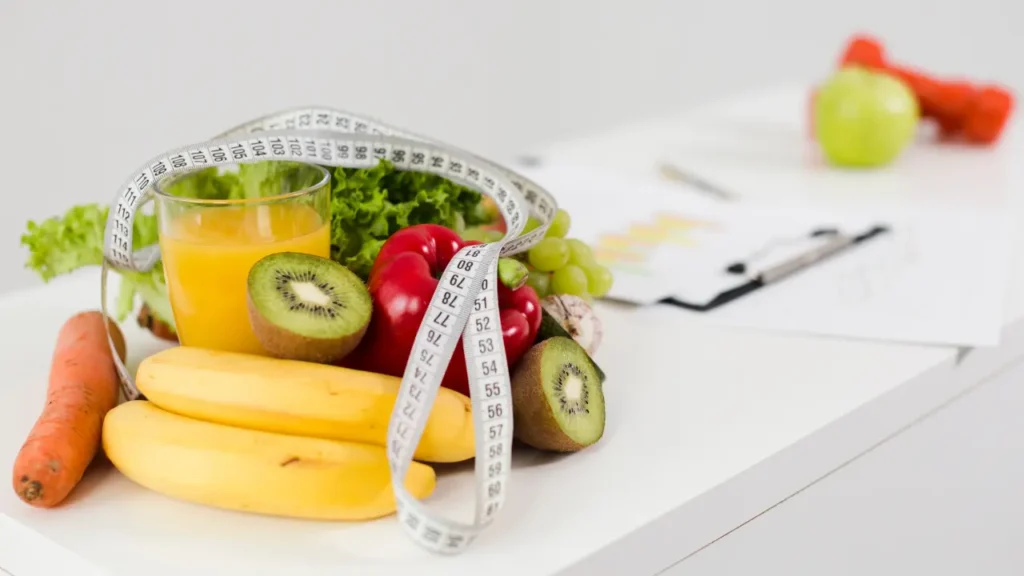Weight loss is one of the most common health goals today, but many people approach it in the wrong way—by skipping meals, trying fad diets, or eating too little. While these methods may show short-term results, they often harm metabolism and lead to weight gain later.
The key to healthy and sustainable weight loss lies in following a balanced diet—one that nourishes your body, maintains energy levels, and still creates a calorie deficit. Let’s understand how you can plan a balanced diet that supports weight loss effectively.
What is a Balanced Diet?
A balanced diet provides all the essential nutrients—carbohydrates, proteins, fats, vitamins, and minerals—in the right proportion. It does not mean eating less; it means eating smart.
The ideal balanced diet for weight loss should:
- Keep you full for longer
- Prevent overeating and cravings
- Provide steady energy throughout the day
- Ensure you get enough protein, fiber, and healthy fats
Key Principles of a Balanced Diet for Weight Loss
1. Control Portion Sizes
Even healthy foods can cause weight gain if eaten in excess. A simple trick is to use the “plate method”:
- Half plate – vegetables & salads
- One-quarter – whole grains (brown rice, quinoa, roti)
- One-quarter – protein (dal, eggs, chicken, paneer)
2. Include Enough Protein
Protein is the most important nutrient for weight loss. It helps build lean muscle, keeps you full, and boosts metabolism.
- Sources: eggs, fish, chicken, lentils, beans, tofu, paneer, Greek yogurt
- Aim: at least 1.0–1.2 g protein per kg of body weight daily
3. Focus on Fiber-Rich Foods
Fiber slows digestion, prevents overeating, and maintains gut health.
- Sources: whole grains, oats, fruits, vegetables, beans, flaxseeds, chia seeds
- Benefits: improved digestion, reduced cravings, stable blood sugar
4. Don’t Eliminate Healthy Fats
Many people avoid fats during weight loss, but good fats are essential. They improve nutrient absorption and keep you satisfied.
- Sources: nuts, seeds, olive oil, avocado, fatty fish
- Avoid: deep-fried foods, refined oils, packaged snacks
5. Hydration is Key
Sometimes thirst is mistaken for hunger, leading to unnecessary snacking. Drinking enough water supports metabolism and detoxification.
- Aim: 2–3 liters of water daily
- Add lemon or cucumber slices for flavor and better digestion
Sample One-Day Balanced Diet Plan for Weight Loss
| Meal Time | Foods to Include | Why It Works for Weight Loss |
|---|---|---|
| Early Morning | Warm water with lemon OR soaked chia seeds | Boosts metabolism, detoxifies body |
| Breakfast | Oats porridge with fruits & nuts OR vegetable upma | High fiber + energy for the day |
| Mid-Morning Snack | A bowl of sprouts salad OR apple with peanut butter | Provides protein + prevents cravings |
| Lunch | 1 roti (multigrain), dal, 1 bowl sabzi, salad, curd | Balanced mix of protein & fiber |
| Evening Snack | Green tea + handful of almonds OR roasted chana | Healthy fats + antioxidants |
| Dinner | Grilled paneer/chicken/fish with sautéed vegetables | Protein-rich, light for digestion |
| Bedtime | Warm turmeric milk OR herbal tea | Aids recovery, promotes good sleep |
Common Mistakes to Avoid
- ❌ Skipping meals – leads to overeating later
- ❌ Eating only fruits – lacks protein and essential fats
- ❌ Following crash diets – slows metabolism and causes nutrient deficiencies
- ❌ Drinking sugary juices – adds hidden calories
- ❌ Late-night heavy snacking – hampers digestion and fat burning
Additional Tips for Success
- Meal Prep: Plan and cook meals in advance to avoid ordering junk food.
- Mindful Eating: Chew slowly and avoid distractions like TV or phone.
- Track Progress: Use a food journal or app to track calories and macros.
- Consistency Over Perfection: Small sustainable changes matter more than extreme diets.
FAQs About Balanced Diet for Weight Loss
Q1: Can I lose weight without cutting carbs?
Yes. Instead of removing carbs, switch to complex carbs like brown rice, oats, and whole wheat. They provide long-lasting energy.
Q2: Is intermittent fasting a balanced diet?
It can be, but only if your meals during eating hours are balanced with protein, fiber, and healthy fats.
Q3: How fast will I lose weight with a balanced diet?
Safe weight loss is around 0.5–1 kg per week. Crash diets may show quick results but are not sustainable.
Q4: Can I eat rice while trying to lose weight?
Yes, but control portions and prefer brown rice or hand-pounded rice over white rice. Pair with vegetables and protein.
Q5: Do I need supplements for weight loss?
Not always. If your diet is balanced, supplements may not be necessary. However, vitamin D, B12, or omega-3 can be considered if deficient.
Final Thoughts
Weight loss should never come at the cost of health. A balanced diet ensures that while you shed extra fat, your body continues to get all the nutrients it needs to function well. Instead of extreme diets or starvation, focus on portion control, protein intake, fiber-rich foods, and hydration.
With the right planning and consistency, you can achieve weight loss goals in a healthy and sustainable way without giving up on taste or nutrition.


